Agricultural contracting can be a very high-pressure and stressful career, especially during the short spells of good weather we get during the summer months. Contractors are required to have modern and up-to-date machinery in order to get the work done during these short periods of good weather.
Setting up
The setup costs involved can be astronomical. A person would need access to good finance in order to purchase adequate machinery. Setting up a small contracting business would require at least two tractors (around 155hp, one with a front loader), one baler (most likely an integrated baler and wrapper to save on labour), one mower, a bale trailer, an agitator, a slurry tanker, a muck spreader and a hedge-cutter to have work all year round. Further implements would depend on the business owner’s desire for scale and drive to satisfy all the farmers’ requirements, such as pit silage and tillage.
See Table 1 for the estimated costs of good-quality secondhand machinery for the above contracting outfit.

Finance
The vast amount of machines purchased by contractors are on finance agreements. Taking the above outfit (see Table 1) over a five-year finance period with monthly payments, a broad indication set to us by finance companies was a 4% flat rate. Buying this secondhand machinery outfit, which already has considerable work done, will cost the person roughly €38,760/year to pay back in finance, excluding the high maintenance, breakage, labour and running costs. To make €38,760 spreading slurry, it would take 554 working hours with the tractor and slurry tanker. To put this into perspective, if you spread slurry for eight hours per day it would take over 69 days of spreading slurry alone just to cover the repayments for the year.
For a newcomer seeking finance, the finance company will look for a business proposal and business projections. Finance companies will evaluate this information and make a decision on a loan.
Credit
Will you be able to access credit to keep your business going over the summer months? Being realistic, contractors are often the last people that farmers tend to pay. However, many oil suppliers and agricultural merchants will not be as tolerant of contractors when it comes to being paid. A young person would have to have money set aside for the day-to-day running of the business, especially in summer months when work volumes are high and money intake is generally lower.
Insurance is another factor which must be considered, especially due to the recent price hikes in the agricultural sector. Insurance can be broken down into a payment scheme similar to that of machinery repayments. Road tax also has to be paid on agricultural vehicles which are on the road. In this case, both tractors will have to be taxed.
Labour
During winter periods, the owner of the business may be able to carry out most tasks themselves, such as hedge cutting, slurry spreading, drawing bales, etc. However, during the busy periods of the summer, contractors will have to employ part-time staff who they must be able to rely on and trust, to get the work done efficiently and quickly while being as safe as possible in the process.
As a young person running a business, will you be able to access part-time labour and pay the going wage to the staff retrospectively if farmers are not paying you until Christmas?
Maintenance and repairs
Machinery repairs and maintenance can also be very costly. If considering setting up an agricultural contracting business, you must consider where you will go to get machinery repaired and maintained, what this might cost you and what credit you will be given by garages/mechanics.
It is best to purchase machinery from dealers who can provide a backup and an after-hours service. It may be worth your while seeking a warranty on purchasing any machinery where possible.
To make your business cost-effective try to maintain your machines yourself as much as possible and you should be willing to consider doing courses in mechanics to aid your knowledge.
Potential customers
One of the most pressing issues on this topic is to consider if there is sufficient work available in your area to justify the high input of machinery, finance, labour, capital and hours.
If there are a number of well-established contractors in your area who are satisfying all of the farmers’ needs, then it is most likely you won’t gain a significant amount of work.
However, if a contractor is retiring in an area and a gap opens up then it may be an option for a career.
Satisfying customers
During spells of good weather in the summer, contractors are very often required to carry out huge volumes of work in a very short window of time. If two to three weeks of rain persist in the summer, all of this work will backlog. If Met Éireann forecasts three to four days of dry weather, contractors then become inundated with work.
To get through this work while satisfying the customers’ needs can be a nearly impossible task for contractors. It is vital that all machinery remains operating to its highest output and avoid downtime from breakages as this may lead to the loss of work if you are unable to get the job done in the time frame provided.
In order for machinery to constantly stay operating during these waves of work, contractors are required to have modern and up-to-date machinery. Being realistic, a contractor doing sufficient hire work with just one baler will find it extremely difficult to get through these spells while retaining and satisfying customers.
Additional income
Beginning an agricultural contracting business from scratch is a huge step for someone to take. Some young farmers may be in a better position to take up part-time hire work with existing farm machinery so investment to an extent may not be necessary. This part-time hire work may generate additional income to the farm with the possibility of gradually building up an agricultural contracting business. Grants that may help young people farming and thinking of hire work which are currently available include TAMS II. This offers up to 60% (for young farmers) grant aided up to a total of an €80,000 investment in low emission slurry spreading equipment. To be eligible for this grant you must meet the following criteria:
Applicants must hold a Department identifier such as a herd number or BPS number.Have a minimum of 5ha which have been declared under the Basic Payment Scheme, Single Farm Payment Scheme/Area Aid/Integrated Administration and Control System in the year of application or preceding year.Or engaged in the breeding, rearing or fattening of pigs and have a minimum of 60 production units at the time of application in accordance with Annex B of the scheme.The upcoming Tillage Capital Investment Scheme also covers some machinery which may be useful for own farm and hire work. The eligibility criteria for this scheme is:
Applicants must hold a Department identifier such as a herd number of or BPS number.Applicants must have a minimum of 15ha of eligible crops declared under the Basic Payment Scheme, or equivalent in the year of application or previous year. Read more
How much should you be paying your contractor?
Estimated agricultural contractor prices for 2017
Agricultural contracting can be a very high-pressure and stressful career, especially during the short spells of good weather we get during the summer months. Contractors are required to have modern and up-to-date machinery in order to get the work done during these short periods of good weather.
Setting up
The setup costs involved can be astronomical. A person would need access to good finance in order to purchase adequate machinery. Setting up a small contracting business would require at least two tractors (around 155hp, one with a front loader), one baler (most likely an integrated baler and wrapper to save on labour), one mower, a bale trailer, an agitator, a slurry tanker, a muck spreader and a hedge-cutter to have work all year round. Further implements would depend on the business owner’s desire for scale and drive to satisfy all the farmers’ requirements, such as pit silage and tillage.
See Table 1 for the estimated costs of good-quality secondhand machinery for the above contracting outfit.

Finance
The vast amount of machines purchased by contractors are on finance agreements. Taking the above outfit (see Table 1) over a five-year finance period with monthly payments, a broad indication set to us by finance companies was a 4% flat rate. Buying this secondhand machinery outfit, which already has considerable work done, will cost the person roughly €38,760/year to pay back in finance, excluding the high maintenance, breakage, labour and running costs. To make €38,760 spreading slurry, it would take 554 working hours with the tractor and slurry tanker. To put this into perspective, if you spread slurry for eight hours per day it would take over 69 days of spreading slurry alone just to cover the repayments for the year.
For a newcomer seeking finance, the finance company will look for a business proposal and business projections. Finance companies will evaluate this information and make a decision on a loan.
Credit
Will you be able to access credit to keep your business going over the summer months? Being realistic, contractors are often the last people that farmers tend to pay. However, many oil suppliers and agricultural merchants will not be as tolerant of contractors when it comes to being paid. A young person would have to have money set aside for the day-to-day running of the business, especially in summer months when work volumes are high and money intake is generally lower.
Insurance is another factor which must be considered, especially due to the recent price hikes in the agricultural sector. Insurance can be broken down into a payment scheme similar to that of machinery repayments. Road tax also has to be paid on agricultural vehicles which are on the road. In this case, both tractors will have to be taxed.
Labour
During winter periods, the owner of the business may be able to carry out most tasks themselves, such as hedge cutting, slurry spreading, drawing bales, etc. However, during the busy periods of the summer, contractors will have to employ part-time staff who they must be able to rely on and trust, to get the work done efficiently and quickly while being as safe as possible in the process.
As a young person running a business, will you be able to access part-time labour and pay the going wage to the staff retrospectively if farmers are not paying you until Christmas?
Maintenance and repairs
Machinery repairs and maintenance can also be very costly. If considering setting up an agricultural contracting business, you must consider where you will go to get machinery repaired and maintained, what this might cost you and what credit you will be given by garages/mechanics.
It is best to purchase machinery from dealers who can provide a backup and an after-hours service. It may be worth your while seeking a warranty on purchasing any machinery where possible.
To make your business cost-effective try to maintain your machines yourself as much as possible and you should be willing to consider doing courses in mechanics to aid your knowledge.
Potential customers
One of the most pressing issues on this topic is to consider if there is sufficient work available in your area to justify the high input of machinery, finance, labour, capital and hours.
If there are a number of well-established contractors in your area who are satisfying all of the farmers’ needs, then it is most likely you won’t gain a significant amount of work.
However, if a contractor is retiring in an area and a gap opens up then it may be an option for a career.
Satisfying customers
During spells of good weather in the summer, contractors are very often required to carry out huge volumes of work in a very short window of time. If two to three weeks of rain persist in the summer, all of this work will backlog. If Met Éireann forecasts three to four days of dry weather, contractors then become inundated with work.
To get through this work while satisfying the customers’ needs can be a nearly impossible task for contractors. It is vital that all machinery remains operating to its highest output and avoid downtime from breakages as this may lead to the loss of work if you are unable to get the job done in the time frame provided.
In order for machinery to constantly stay operating during these waves of work, contractors are required to have modern and up-to-date machinery. Being realistic, a contractor doing sufficient hire work with just one baler will find it extremely difficult to get through these spells while retaining and satisfying customers.
Additional income
Beginning an agricultural contracting business from scratch is a huge step for someone to take. Some young farmers may be in a better position to take up part-time hire work with existing farm machinery so investment to an extent may not be necessary. This part-time hire work may generate additional income to the farm with the possibility of gradually building up an agricultural contracting business. Grants that may help young people farming and thinking of hire work which are currently available include TAMS II. This offers up to 60% (for young farmers) grant aided up to a total of an €80,000 investment in low emission slurry spreading equipment. To be eligible for this grant you must meet the following criteria:
Applicants must hold a Department identifier such as a herd number or BPS number.Have a minimum of 5ha which have been declared under the Basic Payment Scheme, Single Farm Payment Scheme/Area Aid/Integrated Administration and Control System in the year of application or preceding year.Or engaged in the breeding, rearing or fattening of pigs and have a minimum of 60 production units at the time of application in accordance with Annex B of the scheme.The upcoming Tillage Capital Investment Scheme also covers some machinery which may be useful for own farm and hire work. The eligibility criteria for this scheme is:
Applicants must hold a Department identifier such as a herd number of or BPS number.Applicants must have a minimum of 15ha of eligible crops declared under the Basic Payment Scheme, or equivalent in the year of application or previous year. Read more
How much should you be paying your contractor?
Estimated agricultural contractor prices for 2017







 This is a subscriber-only article
This is a subscriber-only article




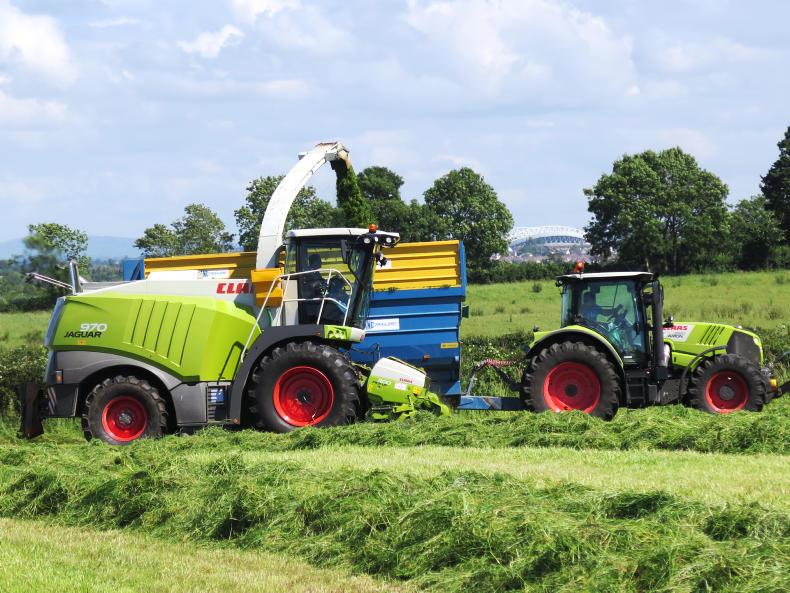
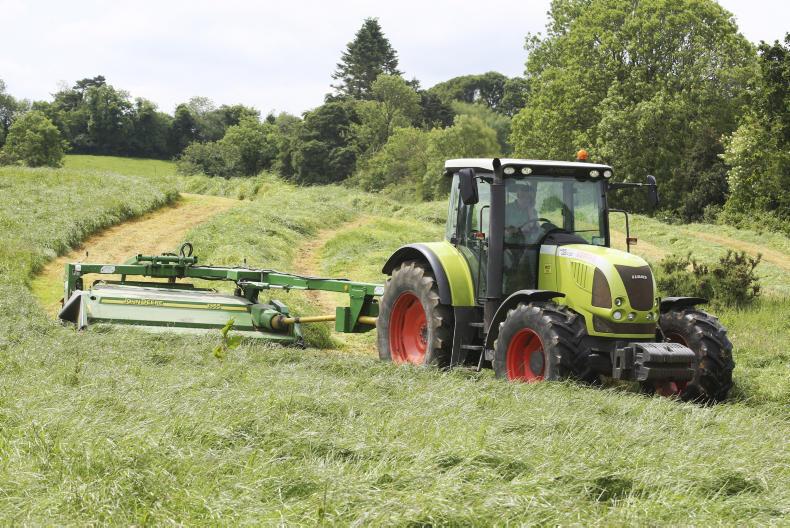
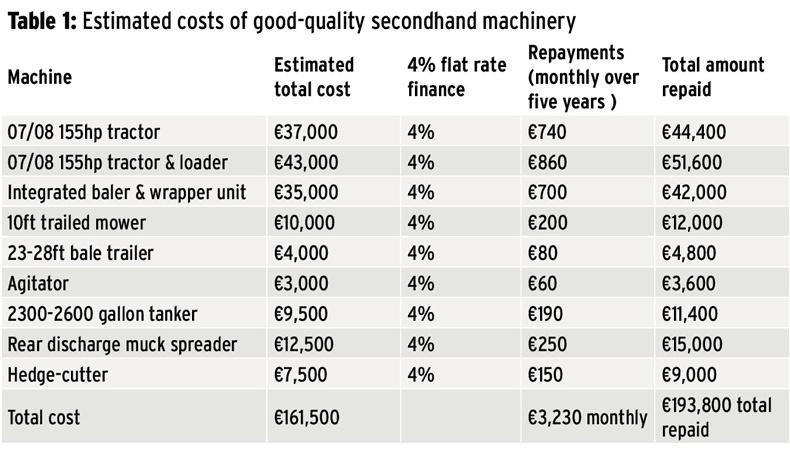



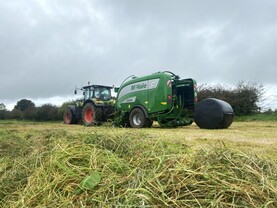
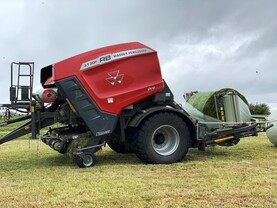
SHARING OPTIONS: